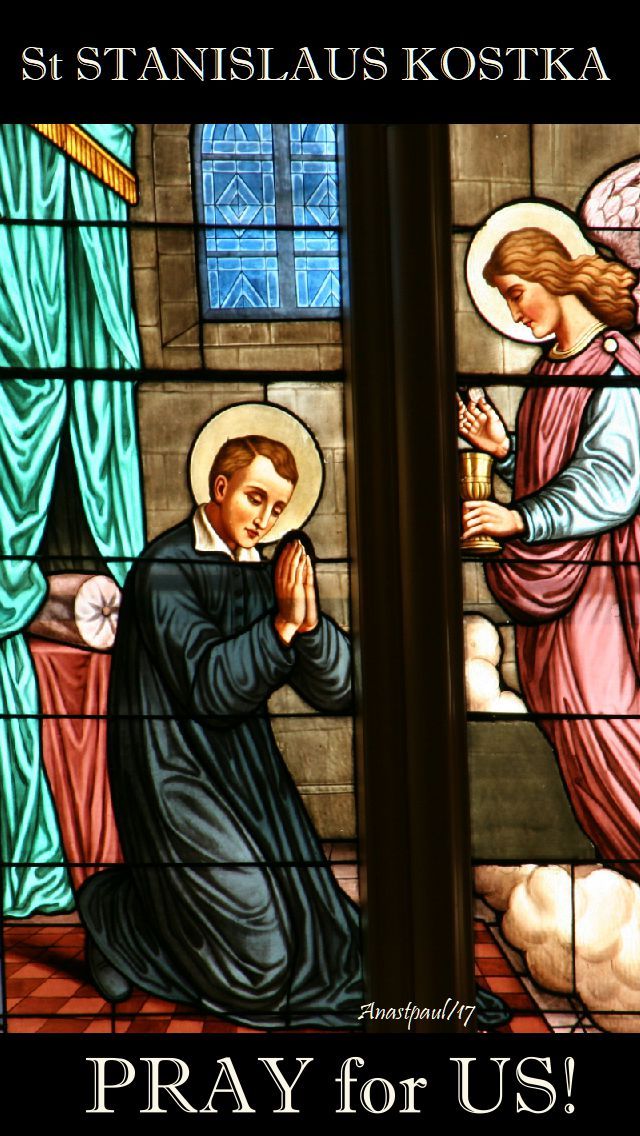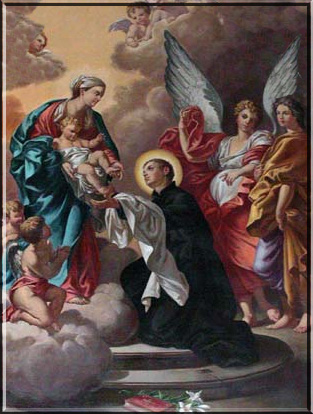Saint Stanislaus Kotska, SJ
Born : October 1550
Died : August 15, 1568
Beatified : Oct 19, 1605
Canonised : Dec 31,1726
Feast : 13 November
 Stanislaus of Polish nobility was born in Rostkow, Mazovia, Poland. Though born into a distinguished family and destined for public life, his parents carefully educated him in the Catholic faith and kept him from all luxury and self-indulgence.
Stanislaus of Polish nobility was born in Rostkow, Mazovia, Poland. Though born into a distinguished family and destined for public life, his parents carefully educated him in the Catholic faith and kept him from all luxury and self-indulgence.
At fourteen, his father enrolled him and his older brother Paul in the Jesuit College in Vienna. Stanislaus studied humanities and was a member of the St Barbara Sodality. He was serious and reticent by nature, dressed simply, studied hard and spent much time in prayer, that his brother nicknamed him “the Jesuit”. His brother who was given to a worldly and carefree way of life started to harass and abuse Stanislaus physically and verbally. Paul’s unjust treatment lasted for eighteen months, but instead of breaking Stanislaus’ resolve, it strengthened him in the practice of virtue and in his desire to become a Jesuit.
Stanislaus became gravely ill with an undiagnosed sickness and asked to receive Viaticum (the last Sacrament). Paul refused to allow this because he did not wish to upset Senator Kimberker, a Lutheran, whose house they were living in and who refused to allow a priest to enter his house with the Blessed Sacrament. When Stanislaus realised that Paul was not going to call for a priest, he prayed to St Barbara, patroness of his sodality, to intercede with God so that he could receive Communion before he died. His humble prayer was answered as St Barbara and two angels appeared to Stanislaus in his room and brought him Communion. He was later cured when Our Lady, carrying Baby Jesus, visited him and placed the Child Jesus in his arms and indicated that he was to enter the Society of Jesus.
Stanislaus approached the Jesuit provincial in Vienna about entering the Society which asked for his parents consent. Knowing that his parents would never allow him to become a Jesuit, Stanislaus was advised by another Jesuit to obtain the permission of the German provincial, Fr Peter Canisius in Augsburg, Germany. Stanislaus walked four hundred and fifty miles to Augsburg only to find Fr Canisius was away in Dilligen, another day’s journey. When the determined Stanislaus found the provincial, he knelt at his feet and offered the letter of introduction from the Viennese Jesuit. Fr Canisius immediately sensed Stanislaus’ sincerity and agreed to admit him. However as Stanislaus felt that he was too near to his family in Poland, the provincial arranged for him to go to Rome with two companions, arriving there a month later.
Stanislaus presented his letter of introduction to the Rome general, Fr Francis Borgia and began his noviceship at the Jesuit residence, the Gesu.
Later he spent a month at the Roman College and the remaining six months at the novitiate of St Andrea. Although his noviceship lasted only ten months, he spent the time in deep and intense prayer and union with God.
 In early August 1568, Stanislaus had a premonition that he would die on August 15. On Aug 10, he was taken ill with a fever, but it was not serious. On Aug 14, he told his brother infirmarian that he was going to die the next day but the brother did not take his remark seriously as he was not critically ill. When he took a sudden turn for the worse in the afternoon, the brother arranged for him to receive Viaticum. That night, Stanislaus spent his time in prayer and repeatedly said: “My heart is ready, O God, my heart is ready”. He asked to be placed on the floor and at three in the morning, he stopped praying and with his face illumined by great joy, indicated to the priests with him that Our Lady was approaching with her angels and saints to take him to heaven.
In early August 1568, Stanislaus had a premonition that he would die on August 15. On Aug 10, he was taken ill with a fever, but it was not serious. On Aug 14, he told his brother infirmarian that he was going to die the next day but the brother did not take his remark seriously as he was not critically ill. When he took a sudden turn for the worse in the afternoon, the brother arranged for him to receive Viaticum. That night, Stanislaus spent his time in prayer and repeatedly said: “My heart is ready, O God, my heart is ready”. He asked to be placed on the floor and at three in the morning, he stopped praying and with his face illumined by great joy, indicated to the priests with him that Our Lady was approaching with her angels and saints to take him to heaven.
Seventeen-year-old Stanislaus died on the Feast of Our Lady’s Assumption. He was buried in the Jesuit church of the novitiate but his remains now rest beneath the altar dedicated to him in the church of St Andrea in Rome. Stanislaus was the first Jesuit to be beatified in 1605 and was canonized by Pope Benedict XIII in 1726.
